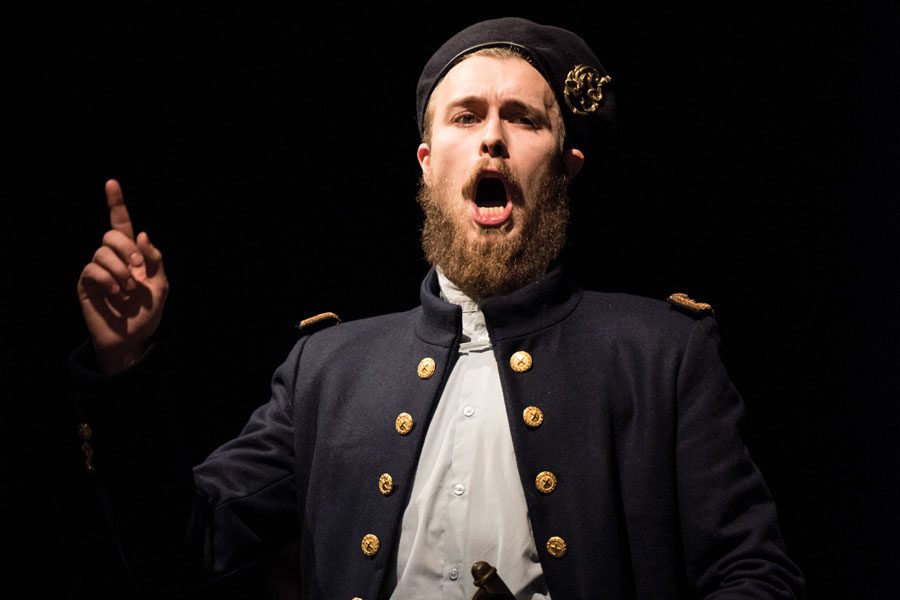Traditional Greek tragedy modernized for department show
Colin Boyle/Daily Senior Staffer
King Agamemnon speaks to the people of Argos upon arriving home after 10 years at war. The contemporary adaptation of Aeschylus’ tragedy premiers Friday at the Louis Theater.
January 26, 2017
A modern rendition of Ancient Greece is coming to the Louis Theater this Friday, with the School of Communication’s newest mainstage production, “Agamemnon.”
The play, originally written by the ancient Greek tragedian Aeschylus, is about King Agamemnon’s return to Argos after the Trojan War to find his home torn by sorrow and a cycle of violence following the war’s 10 years of devastation.
This adaptation, which was originally written as a radio play and is still set in ancient Greece, interested director Sonny Das for its contemporary, yet eloquent, language.
Das, a third-year MFA student, said he appreciates that this adaptation incorporates flashbacks and memories of the government’s decisions during the Trojan War. In addition, all of the big events happen in front of the audience rather than being narrated by a chorus, as is usually typical for a Greek tragedy, stage manager Cairo Dye said.
Instead of a chorus narrating the action, there are three chorus members, two of whom have seen the devastation of the Trojan War and the third who was born after it ended, Das said. These chorus members are developed characters who voice their opinions on the actions of the government, Dye said.
These opposite perspectives cause tension in Argos. The youngest member of the chorus believes the government was doing well by its citizens by going to war, while the older members of the chorus disagree with the choice to go to war.
The chorus represents the entire city of Argos, of which Agamemnon is king. Das said the chorus can see all the choices the government made in regard to the Trojan War, but it can’t do anything because its members are commoners who have no power in society.
“This centering of having the three chorus members sort of be the protagonists of the play, rather than the high and the mighty, felt really democratic to me,” Das said.
The story is told from the vantage points of one of these three characters at any given time, lighting designer Matt Sharp said. Their descriptions highlight what is happening with the corruption of the royalty of the time.
“A lot of the play is about these three characters — who don’t have names — coming to terms with those decisions that the people in power have made,” the second-year MFA student said.
Das said he also wants audiences to notice the parallels between their lives and these three characters. He said he hopes this story encourages people to think about how they can use their voices, as the characters in the play don’t have the opportunity to use theirs.
“So often we abscond (our voices), and we feel like we have no control, whereas these people actually have no control,” Das said. “I’m hoping that it will encourage people not to sit around and exercise the power that you have rather than bemoan the fact that you don’t have any.”
Email: [email protected]
Twitter: @sophiemmann


